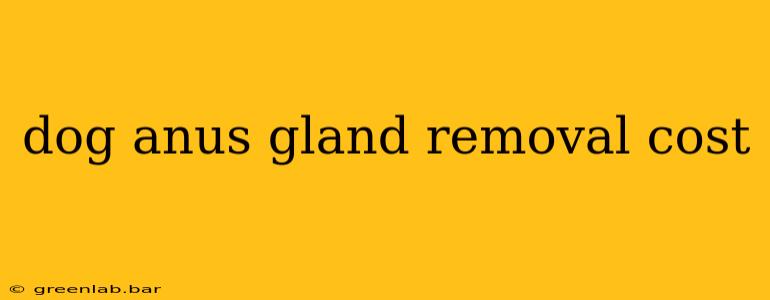Anal gland issues are a common problem for dogs, causing discomfort and potential health complications. While some issues can be managed with medication or manual expression, in severe or recurring cases, anal gland removal surgery might be necessary. This guide delves into the cost of this procedure, influencing factors, and what to expect.
Understanding Anal Gland Removal Surgery
Anal glands, also known as anal sacs, are small scent glands located on either side of your dog's anus. They secrete a foul-smelling fluid that aids in marking territory. However, these glands can become impacted (blocked), infected (abscessed), or even require removal due to recurring problems. Surgical removal, also known as anal sacculectomy, is a last resort after other treatments have failed. The veterinarian will carefully assess your dog's condition to determine the best course of action.
Factors Affecting the Cost of Anal Gland Removal
Several factors contribute to the overall cost of anal gland removal surgery for your canine companion. These include:
1. Geographic Location:
The cost of veterinary care varies significantly depending on your location. Urban areas typically have higher costs compared to rural areas. This difference reflects the cost of living, clinic overhead, and veterinarian salaries.
2. Veterinary Clinic Type:
Specialty veterinary clinics and emergency animal hospitals often charge higher fees compared to general practice clinics. Specialty clinics may possess more advanced equipment and highly specialized veterinary surgeons, resulting in a higher cost.
3. Anesthesia and Monitoring:
Anesthesia is a crucial part of the surgery. The type of anesthesia used, along with the monitoring required during and after the procedure, influences the overall cost. The complexity of your dog's case may also necessitate more intensive monitoring, adding to the expense.
4. Pre-operative and Post-operative Care:
Pre-operative blood work and other diagnostic tests are necessary to ensure your dog is healthy enough for surgery. Post-operative care, including pain medication, antibiotics, and follow-up visits, also contribute to the total cost. The severity of the condition and your dog's individual needs will dictate the extent of this care.
5. Complications:
Unexpected complications during or after the surgery can significantly increase the overall cost. These complications may require additional treatments, medication, hospitalization, or further surgical intervention.
Estimated Cost Range
While providing a precise cost is impossible without a veterinary examination, a general estimate for anal gland removal surgery in the United States can range from $500 to $2,000 or more. This is a broad range, and the actual cost could fall significantly above or below this depending on the factors mentioned above.
What to Expect Before, During, and After Surgery
- Before Surgery: Your vet will conduct a thorough examination, potentially including blood tests and X-rays. They will discuss the procedure, risks, and recovery process in detail.
- During Surgery: The surgeon will remove the affected anal sacs. The procedure is typically performed under general anesthesia.
- After Surgery: Your dog will need a recovery period, which may involve pain medication, antibiotics, and restricted activity. Regular follow-up appointments are crucial to monitor healing and address any complications.
Finding Affordable Veterinary Care
Several options exist for finding more affordable veterinary care. These include:
- Checking with local animal shelters or rescue organizations: Some offer discounted or subsidized veterinary services.
- Exploring payment plans: Many veterinary clinics offer payment plans to make care more accessible.
- Looking into pet insurance: Pet insurance can help offset the cost of unexpected veterinary bills, including surgeries.
Disclaimer: This information is intended for general knowledge and informational purposes only, and does not constitute medical advice. Always consult with a licensed veterinarian for any health concerns regarding your pet. The cost estimates provided are approximations and may vary significantly.

